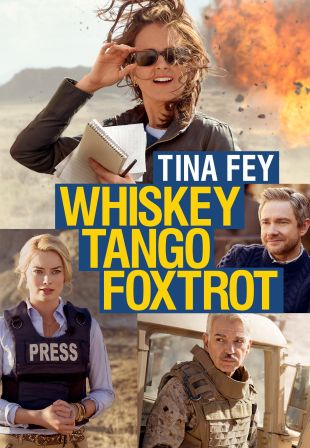When television news reporter Kim Baker (Tina Fey) arrives in Kabul, she is immediately informed that her decision to take a job as an embedded war correspondent marks a turning point in her life. She has now entered the "Kabubble," a dangerous, frantic, and pulsating existence that fundamentally changes her, informing the way she sees both the world and herself. For better and for worse (but mostly for better), the audience is also restricted to Baker's insular viewpoint. Directed by Glenn Ficarra and John Requa, Whiskey Tango Foxtrot is (very) loosely based on print journalist Kim Barker's memoir, The Taliban Shuffle: Strange Days in Afghanistan and Pakistan. The project reunites Fey with Robert Carlock, who wrote the film's screenplay after working with Fey on Saturday Night Live, 30 Rock, and Unbreakable Kimmy Schmidt.
Baker's world is populated mostly by fierce, fearless personalities: her friend and professional counterpart Tanya (Margot Robbie), no-nonsense General Hollanek (Billy Bob Thornton), and crass, flirty photographer Iain MacKelpie (Martin Freeman). She is shuttled around and protected during her assignments by her reserved handler, family man Fahim (Christopher Abbott), who, despite the large social barrier between men and women in Middle Eastern culture, tries to connect with her by reading Oprah Winfrey's O Magazine. During her journey, Baker finds it difficult to remain tethered to the life she left behind as she struggles to separate the brutality of war from the excitement and vibrancy that her new job offers.
Rather than attempting to be subversive, Whiskey Tango Foxtrot chooses to stick to the witty humor that Fey and Carlock are known for. Laughs are drawn primarily from exasperation, such as Baker's resigned attraction to the intriguing Iain (the charming Freeman is squarely in his element here) and her frustration with Afghanistan's social and gender mores (her aversion to headscarves frequently causes problems). This brand of comedy serves Thornton particularly well, as his Marine leader steals every one of his scenes with hilariously stern retorts (including a terrific reaction to Baker's accidental use of a Navy affirmation) and pithy analogies. Baker represents, in some ways, a lighter version of Sgt. William James from The Hurt Locker, as both characters must find a way to balance the adrenaline rush of the battlefield with their humanity.
Because the film relies so heavily on Baker's point-of-view, the strife and casualties that resulted from American intervention in the Middle East frequently take a backseat to this one reporter's existential crisis. This is exemplified by a conversation that Baker has with Tanya and an Afghani friend named Shakira (Sheila Vand) at a local nightclub: After Baker vents that she came to Iraq because of a pronounced professional dissatisfaction, Shakira remarks that that's the whitest thing she has ever heard. Everything, even the war, is seen through the prism of Baker's feelings of privilege and guilt, which sometimes seems to trivialize the carnage and global impact of what she's covering. Whiskey Tango Foxtrot's whiteness is also all-too-evident in its casting. While Abbott gives a highly assured, nuanced performance, the fact that he is an American actor playing an Afghani man comes off as somewhat tone-deaf during a time when hard questions are being asked about Hollywood's lack of roles for nonwhite performers. In addition, veteran British actor Alfred Molina plays an aggressively sexist, one-note caricature of a privileged Middle Eastern politician, a character that would still come off as amateurish and ridiculous even if it wasn't such an offensive stereotype.
The movie's lack of focus extends to its odd editing choices, which undermine several key facets of its sense of humor (for one thing, the filmmakers would have been better served if they had included more of Thornton). However, Fey and Carlock's comedy chops shine through more often than not, and they are clearly adept at balancing the pathos with absurdist gags. The laughs here are genuine, and if the duo continue to find comedy in unlikely situations like this one, then their film careers look to be as promising as their work on television.
